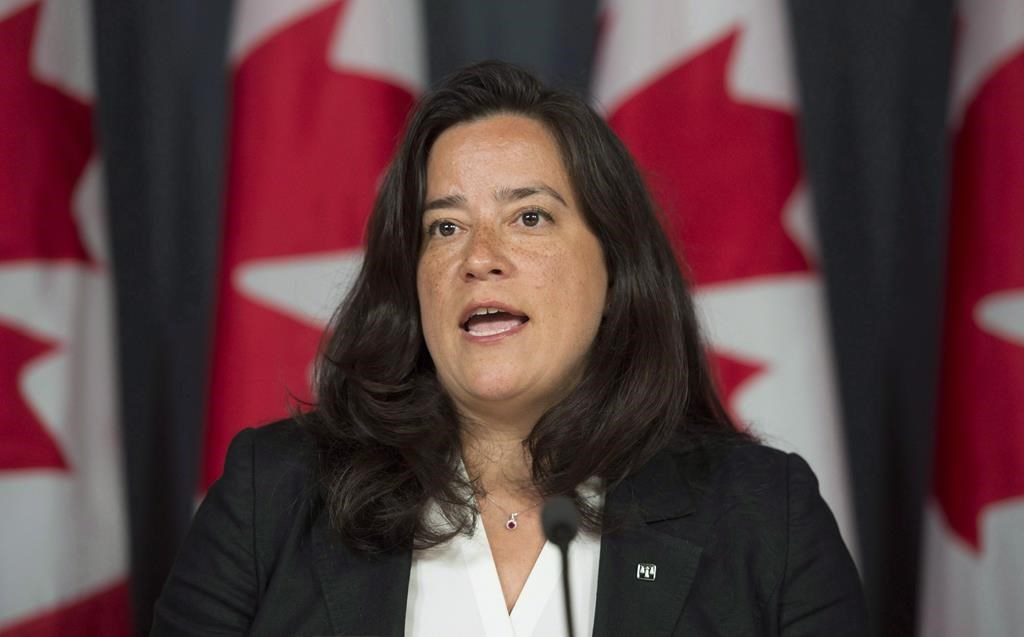Prime Minister Justin Trudeau will ask those tasked with developing a short list of candidates for the Supreme Court to include judges from Atlantic Canada, but that does not mean someone from the region will end up getting the job.
"The next appointment to the Supreme Court of Canada will not necessarily be a person from Atlantic Canada," Justice Minister Jody Wilson−Raybould said Thursday during an appearance before the House of Commons justice committee.
The Liberal government announced last week that a new non−partisan advisory board will choose potential new judges to sit on the Supreme Court, a move characterized as a way to bring more transparency — and less partisan sparring — to the process.
Justice Thomas Cromwell, who is from Nova Scotia, will retire next month.
The convention would have been for Cromwell to be replaced by another judge from Atlantic Canada.
The Liberals came under criticism last week when they indicated the seven−member advisory board, chaired by former prime minister Kim Campbell, would consider candidates from across the country.
Wilson−Raybould pointed out on Thursday that in his mandate letter to Campbell, Trudeau asked the advisory board to include Atlantic Canadians on its short list of three to five potential candidates and that it consider the custom of regional representation on the high court as it sorts through the names.
"I recognize that regional representation is important," Wilson−Raybould said.
"So too is diversity. So too is ensuring that we have the most qualified jurists that will fill the vacancy," she said, adding the expects a significant number of jurists from the Atlantic region to put their names forward.
Conservative justice critic Rob Nicholson said that did not go far enough and suggested it would not go over well with the 32 Liberal MPs who swept the region in the federal election last year.
In addition to striving for more diversity on the bench, the advisory board is also being asked to find candidates who are "functionally bilingual".
Wilson−Raybould defined that Thursday as someone who can understand oral and written arguments in both English and French — to be assessed through the Office of the Commissioner for Federal Judicial Affairs.
"The ability of the justice to engage in conversations with counsel is not required, but would be, certainly, a beneficial attribute of an individual wanting to put their name forward," she told the committee.
NDP leader Tom Mulcair, who joined the committee meeting, was unimpressed.
"I’ve never seen anybody say that you can be functionally bilingual even if you are not able to speak a word of the other language," Mulcair told reporters.
Earlier Thursday, Chief Justice Beverley McLachlin said it is taking too long to name a replacement for Cromwell.
“The court needs – and the Canadian people are entitled to – a full complement of nine judges to decide the complex and important questions before it,” McLachlin said Thursday in an address to the annual legal conference of the Canadian Bar Association.
McLachlin would not comment on the fact that the new justice might not necessarily come from Atlantic Canada.
"There are a lot of factors that go into an appointment and that’s the government’s responsibility and I’m not going to tell them how to do their job," McLachlin said in a news conference following her remarks.
McLachlin also said that question might one day come before the Supreme Court, but did not elaborate.
In her speech, McLachlin said she is also concerned about 44 other judicial positions nationwide the federal government has yet to fill.
"There is something deeply wrong with a hiring scheme that repeatedly proves itself incapable of foreseeing, preparing for and filling vacancies as they arise," she said.
McLachlin said the vacancies can restrict access to justice, which she said should be a top priority to ensure the public does not lose confidence in the system.
"If people are excluded from the system, if they conclude it exists only to serve the interests of the elites, they will turn away. Respect for the rule of law will diminish, and our society will be the poorer," she said.




Comments